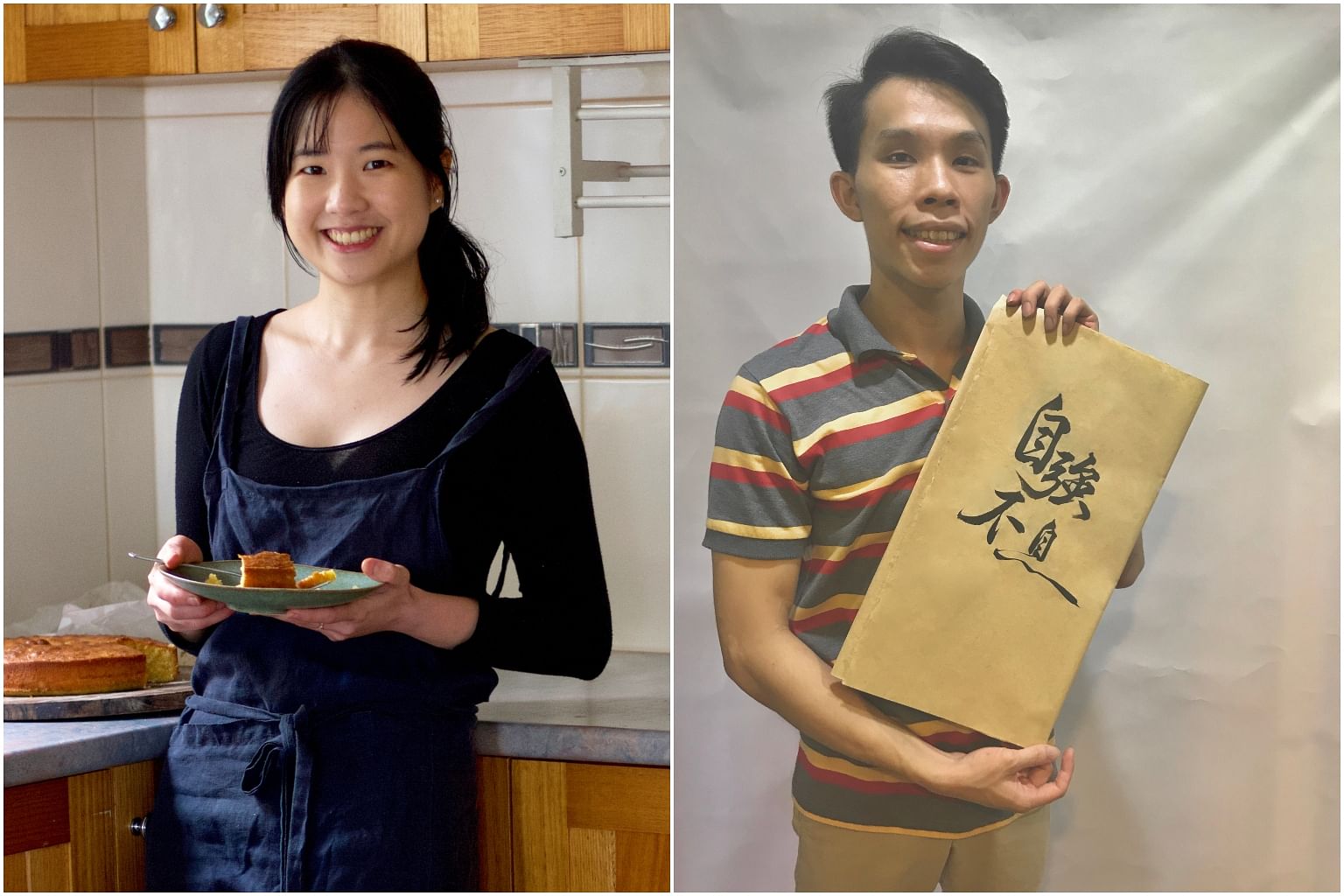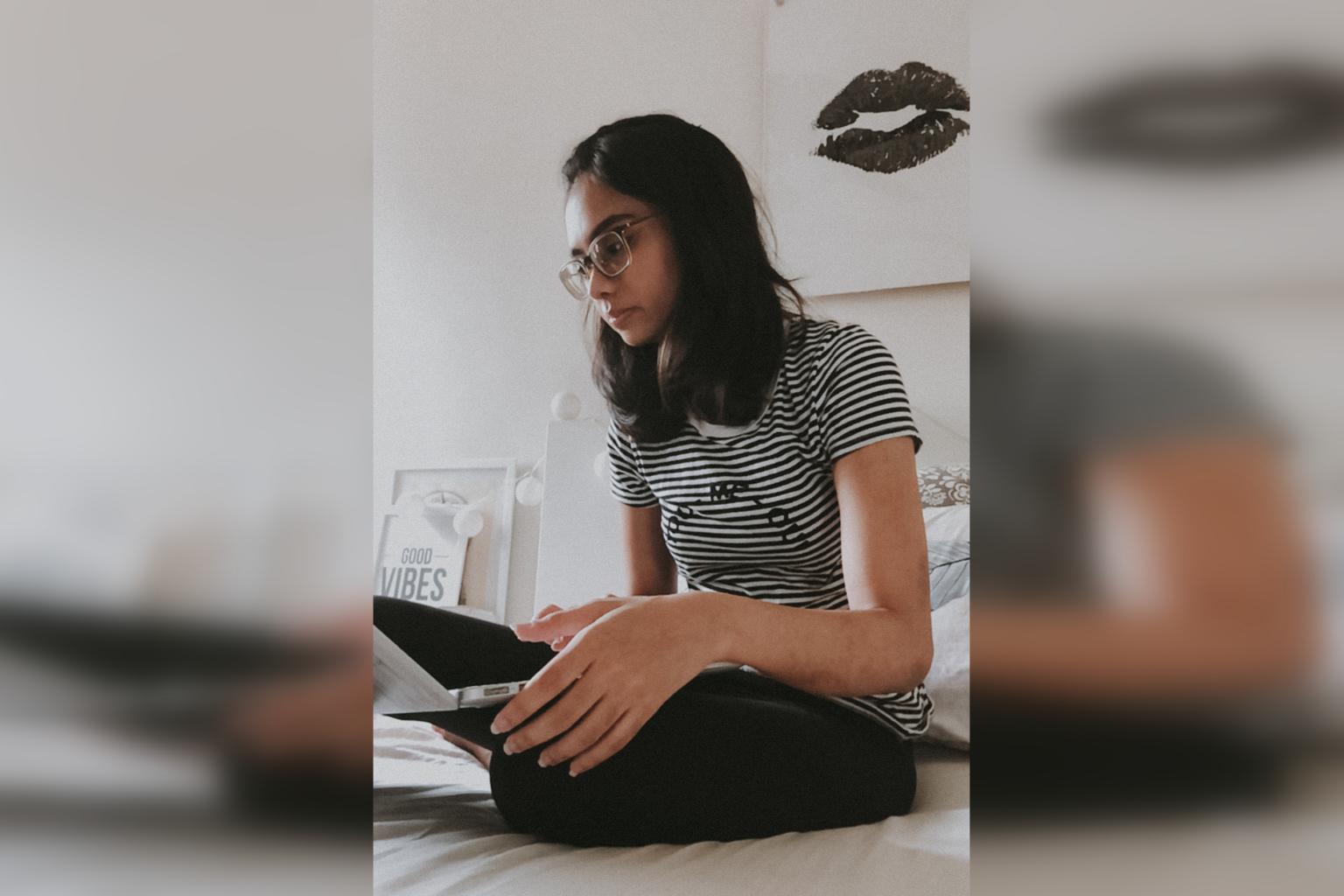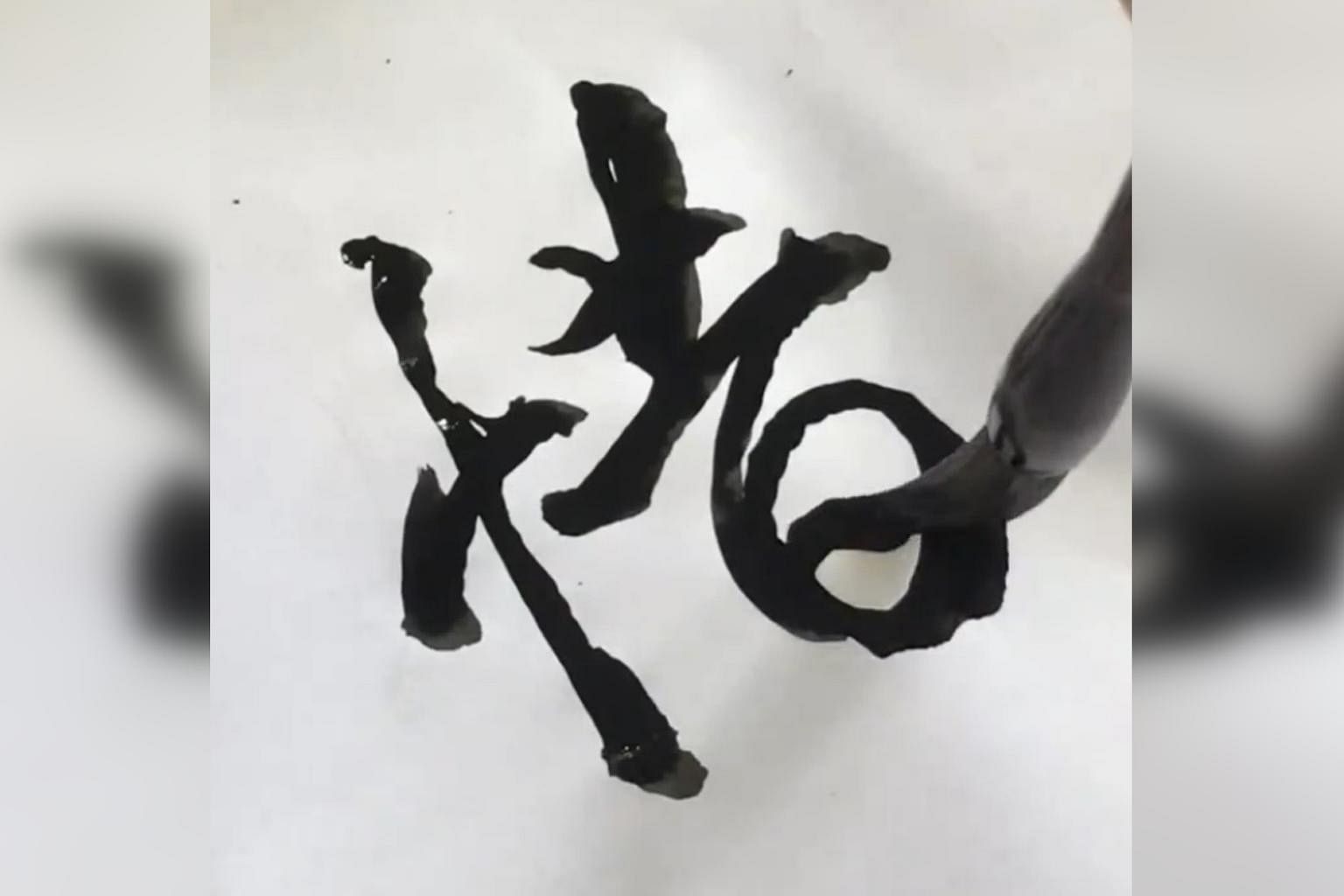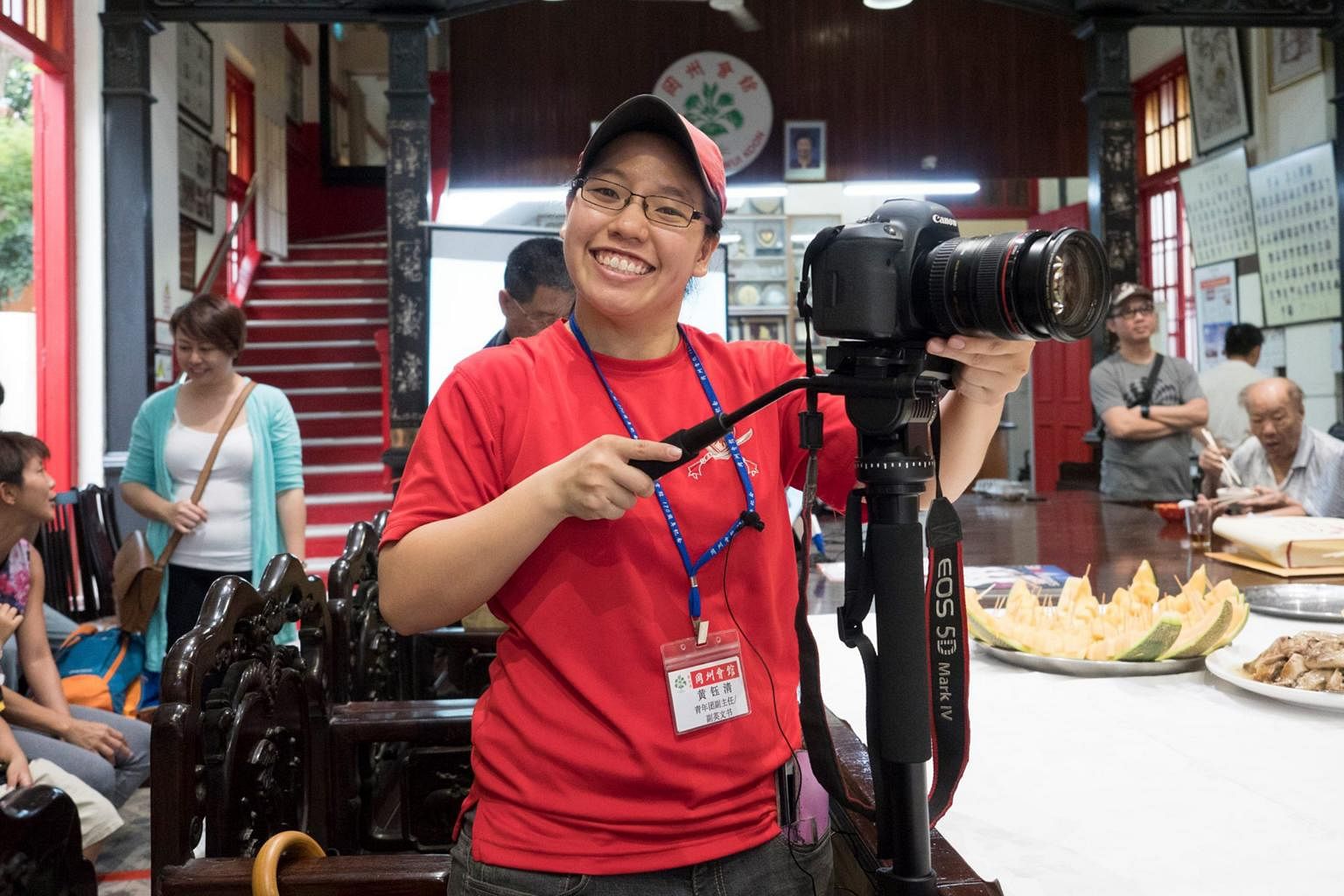COVID-19 SPECIAL
Neither dusty nor old: Youth come up with fresh ways to document heritage during Covid-19 pandemic
Sign up now: Get ST's newsletters delivered to your inbox

Founder of Singapore Noodles Pamelia Chia (left) and founder of Hakka Scribbles Sung Chang Da.
PHOTOS: PAMELIA CHIA, VERONICA SUNG
Hannah Bock
Follow topic:
SINGAPORE - While heritage may be thought of as being limited to old books or museum aisles, it is much more than a relic of the past - it is constantly being shaped.
"What you should remember is already in your history textbook," says Mr Choo Lip Sin, 49, who is in charge of community tours at heritage group My Community. "What's important now is to empower people to discover what belongs to them, so they can own it and decide what they want to remember or keep."
Some young adults, in particular, have stepped up to the challenge with more free time on their hands as a result of social distancing measures to stem the spread of Covid-19, initiating projects to share what they have learnt or experienced with the public.
Singapore Heritage Society executive director Chua Ai Lin, who is in her 40s, says: "Heritage is definitely not something old and dusty. Among young people, there are cool ways of presenting it."
For instance, there is the Circuit Breaker Zine, a 70- to 100-page digital magazine comprising visual and literary works about how life has been affected by Covid-19, with topics ranging from mental health to inequality to the experiences of front-line healthcare workers.
Co-editors Gao Wenxin and Michelle Lee, who are both 23 and work as freelance writers, aim to publish it next month or in August.
Similarly, last month, the National Youth Council and marketing agency Dstnct reached out to about 100 young adults aged between 15 and 35 for the memory project Dear Covid-19, where they wrote letters addressed to the coronavirus and participated in virtual photo shoots of life at home under the circuit breaker measures.
In one such letter, fresh graduate Megha Saha shared how her "most immediate reflex" was to think about how the virus had affected her plans - such as the abrupt end to her school semester or a cancelled graduation trip.
However, as the 23-year-old reflected on how much harder the pandemic was hitting vulnerable groups, she went on to volunteer as an English-Bengali translator for the migrant worker community, which became "perhaps the best, most fulfilling decision (she) has made to date".

The Dear Covid-19 team says it recognised the need to document this "historic moment in time" as the current generation of youth has never before been through such a "large-scale collective experience, brought about by Covid-19".
Dear Covid-19 also features images and stories posted by people in Singapore on Facebook and Instagram, under the hashtag #DearCovid19SG, which has garnered about 400 posts since May 20.
The website says: "Some day in the future, we will look back and these stories will serve as a reminder of our daily lives during these unsettling times."
Here are three youth who have started their own heritage projects in recent months.
CHEF, 29, DOCUMENTS SINGAPORE'S FOOD CULTURE
When chef Pamelia Chia moved to Melbourne with her husband in 2018, she noticed a puzzling dish on menus there - Singapore noodles.
As an Australian friend of hers puts it, it is just "noodles with a bunch of Asian stuff in it", says the 29-year-old, who works at both a cooking school and a restaurant.
Realising how little foreigners knew of Singapore cuisine - beyond chilli crab or chicken rice - she created a platform highlighting food that "actual Singaporeans cook and eat", such as sambal tumis, mee soto and nasi briyani.
"There is so much wisdom and knowledge in Singapore about our food, but it mainly rests with the older generation, who sometimes see it as a kind of inheritance and are hence reluctant to share with people outside their family," she says.
"And if you learn cooking from any 'auntie', the phrase agak-agak (Malay for estimate) comes up a lot - it is all about the intuition that comes with experience, which can be intimidating."
She recalls learning to make abacus seeds from her husband's mother. "Instead of telling me to buy, say, 200g of minced pork, she would tell me to get a dollar's worth at the wet market. I was very aware of the need for clear recipes, video tutorials and visuals that outlined all the tips and tricks you'd learn from spending time with an ah ma (grandmother)."
Apart from consulting "aunties", Ms Chia mainly does her research online, comparing recipes and reading descriptions on blogs.
Her background as a chef helps her identify "what makes a good dish great" and "cobble together a crude recipe" as a starting point to test in her kitchen.
Though she cooks freely, grabbing ingredients and seasoning by estimation, she weighs and documents the exact quantities she uses so her followers can duplicate the results in their own homes.
On Singapore Noodles, she also welcomes contributions from the community, especially for recipes from cuisines she is not as familiar with, such as mango pachadi (Indian) and kueh siput (Malaysian).
Singapore Noodles' website and Instagram @sgpnoodles went live in early March and the Instagram account has more than 3,600 followers.
A foodie at heart, Ms Chia says preserving and promoting traditional dishes is important because, "first of all, they taste so good".
For example, the first time she made Nonya dumplings at home from scratch, she was overwhelmed by their flavour, which was so different from the "characterless dumplings" she grew up eating.
"It made me think about how much we have missed out on because our culture has shifted to one that thinks of cooking as a chore to get over and done with. It would be such a pity if the knowledge of how to prepare these things properly was lost."
Learning to prepare traditional dishes while away from home has also strengthened her sense of identity. Citing the example of rice dumplings, she says: "Bak chang were always something that magically appeared on the table whenever the (Dragon Boat) Festival came along. But now that I am far from home, I find that it is really food that grounds me.
"When I learnt to make bak chang with my mother-in-law via a video call back home, she in turn phoned her mother for further advice, and I felt as though I was part of a lineage, as though I was receiving an inheritance or an intangible heirloom."
IN TOUCH WITH HIS ROOTS THROUGH HAKKA SCRIBBLES

Mr Sung Chang Da fondly remembers his childhood days, when he would listen to stories told by his aunt about his family's life back in an Ipoh kampung.
"I heard a lot about how they tapped rubber sap in the plantations and washed dulang (collected tin ore) around the tin mines," says the 25-year-old, who does freelance work including research in heritage.
"These were industries with many Hakka labourers and, somehow, I just came to identify with that humble beginning even though I live a cushy middle-class life."
Until recently, his family also travelled to the kampung every Chinese New Year, where he says he feels at home, and gathered with his relatives, "merrymaking and speaking Hakka".
Mr Sung, whose parents are both Hakka, is not only fluent in speaking the Chinese dialect, but also picked up writing Chinese calligraphy, which he finds beautiful for its "movement and dynamism".
In early April, he started the Instagram account Hakka Scribbles, where he shares photographs of his calligraphy alongside a caption explaining the Hakka term, often drawing links to similar words or phrases in other languages.
In his first post on April 9, he muses: "I've always liked the sound of the word soap in Hakka, fan gan. I looked it up and it turns out, it's actually supposed to be pronounced gian - guess the pronunciation I inherited was borrowed from Cantonese.
"Not surprising in linguistics really. The Malay word for soap, sabun, and the Hokkien sap bun both ultimately derive from the Latin sapo."
Mr Sung, who has two older sisters who understand but do not speak Hakka, tells The Straits Times: "I have always been passionate about my Hakka heritage and I'm a linguistics nerd.
"I chose to use social media because it is the most accessible way to reach young people these days. I want to let other young Hakka enthusiasts know they are not alone and, hopefully, encourage them to start learning Hakka too."
He was very heartened when a man in his 30s asked him for tips on how to pick up Hakka. The man had wanted to get in touch with his roots, but did not have family members to practise the dialect with.
Speaking Hakka is about community spirit, says Mr Sung, adding: "I started ordering my food using Hakka and the breakfast stall auntie at the Nanyang Technological University hall canteen gave me extra food on a few occasions."
Besides liking how Hakka has "an earthy, grounded feel", he also believes learning it is his way of affirming his predecessors who migrated here and their efforts to build a better life for future generations.
On what young adults can do to preserve their heritage, he says: "It's about seeing yourself not as an atomic individual, but as part of a chain of people stretching from the past and into the future. So if you care about your heritage, recognise your role in the chain and pick up something that you can pass on."
RESEARCHER STARTS REPOSITORY FOR FESTIVALS

Independent researcher Lynn Wong is trying to bring back a forgotten festival.
The Seven Sisters' Festival, described as a Chinese Valentine's Day, was last celebrated around the 1970s, on the sixth night of the seventh lunar month, and now exists only in the fading memory of some seniors.
"But it was a big deal in the 1950s," the 31-year-old says. "It's like, can you imagine if something like Chinese New Year disappeared?"
Normally, her work - which includes a research project on kinship-based clans that have been around for more than 100 years - is already a "race against time" to document "disappearing heritage".
"Covid-19 only accelerated everything. I had been waiting for festivals such as Qing Ming or Mazu's (Sea Goddess) Birthday to document their rituals or veneration songs, but they were cancelled and places of worship closed," she adds.
"It also saddened me to see other festivals close to the hearts of Singaporeans being scaled down."
Ms Wong says she is both "antsy to do something about it" and "quite kaypoh (Hokkien for busybody)" to find out how other people were keeping their cultural celebrations and traditions alive.
As such, in late April, she launched #SgICHxCovid19, a repository of Singapore's intangible cultural heritage.
Anyone who has recently observed a cultural or religious event can share his or her experience via the repository's typeform, which will then be posted on its Instagram or Facebook page.
For instance, a Facebook post on May 30 about observing Ramadan amid the coronavirus pandemic reflects on "various absences", such as not being able to break fast with porridge collected from the mosque, or performing prayers at home instead.
But the contributor Rizwana Begum says "there were days of fullness because of what still remained", like appreciating beauty in ordinary things and a chance for self-reflection.
Ms Wong says that by gathering stories from people of different backgrounds, she hopes #SgICHx
Covid19 can be a platform for "us to understand one another better".
In the future, it may also be a resource on how these events have been transformed by Covid-19.
For instance, Ms Wong says she saw a post on Instagram about celebrating Qing Ming with fast food at home this year, instead of going to the cemetery or columbarium.
"It touches me deeply every time someone submits a story," she says.
"Not only is it interesting, but culture is also something very personal, so I value that trust and hope more people will come forward to share their stories."
•Typeform link: str.sg/JPAv

